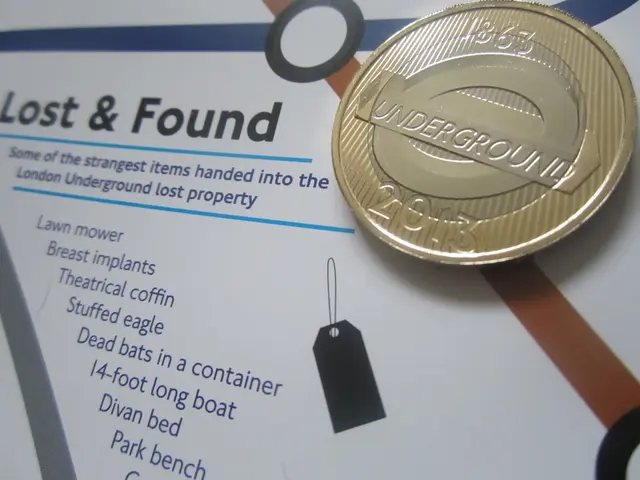Acquiring construction financing: strategies for assembling the necessary down payment
Sneaky Ways to Use Your Stock Portfolio for Real Estate: No Need to Cash Out Immediately
🔗 Facebook | 🔗 Twitter | 🔗 Whatsapp | 🔗 E-Mail | 🔗 Print | 🔗 Copy Link
Worried about parting with your lucrative stock portfolio to buy real estate? The good news is, you don't have to sell your assets right away. Plenty of sneaky ways exist to integrate your portfolio into your property funding without dissolving it. Here's all you need to know!
You've probably got big retirement plans for that well-stocked portfolio of stocks. But when the need to purchase property arises, the question remains: Should I sell my stocks and grab equity, or is there another way to work them into my property financing?
Securities like stocks offer appealing returns in low-interest savings scenarios, outperforming time and fixed deposits by offering realistic returns between 6% and 8%. However, there’s no guarantee, as investing in securities always comes with a risk, since no one can accurately predict price movements.
Don't Forget to Mention Your Portfolio to the Bank
"If your portfolio is thriving, it's only natural to want to hold onto it," says Thomas Saar, a real estate financing expert at Dr. Klein Financial Services. But that doesn't always have to be the case. "It's possible to employ your portfolio for construction projects without selling it, albeit not with every bank or portfolio," added Saar.
To integrate your securities portfolio into your financing concept, the bank may use it as collateral, either passively or actively. Financial advisor Dirk Eilinghoff from the Finanztip consultancy portal recommends briefing the bank about your portfolio, even if you don't intend to utilize it, as it could improve your creditworthiness and potentially secure you a better loan deal.
Temporary Portfolio Transfer for Better Terms
"Few people are aware that a securities portfolio can also be temporarily surrendered to the bank to secure favorable financing terms, such as serving as collateral," said Thomas Saar. "Now, the bank benefits from the security, and the customer continues to reap any returns and dividends from their portfolio. However, you'll need a strong, diversified portfolio for the bank to accept it."
Also, be aware that the bank will only recognize a portion of your portfolio’s value as collateral, applying discounts of 40-50%. "The unpredictable nature of price fluctuations means that you should expect discounts of up to 50%, explain Saar. For example, if your portfolio is worth €100,000, the bank may only recognize €50,000—€60,000 of it as collateral, depending on the portfolio's structure."
Negotiate Your Way to Success
Your portfolio can also be actively used to repay your construction loan. "For instance, you can allocate dividends towards financing your construction loan or use the portfolio's value after 10 or 20 years to pay off the remaining debt," said Thomas Saar. However, brokering such a deal requires financial savvy and excellent negotiation skills.
"Banks aren't always forthcoming with customer-friendly offers, so you'll have to be proactive and engage in discussions with them," added Saar.
Banks Handle Customer Deposits Differently
"Different banks treat customer deposits differently," said Thomas Saar. "Some insist on having all access rights to prevent customers from making changes. Others want the customer to transfer the entire or part of their deposit to them as collateral. And yet others let things remain as they are." Ideally, the customer would wish to maintain their deposit as-is. However, these negotiations must be conducted on an individual basis with your bank.
Pulling the Plug on Your Deposit
There might come a time when selling your deposit is unavoidable. "In this case, investors will give up the potential returns and investment risks they'd previously enjoyed in exchange for a stable interest rate," said Eilinghoff. "The resulting equity allows for a reduced financing amount and thus a lower interest and repayment burden."
That said, be aware of the potential tax implications of liquidating your deposit. Up to 27.99% of your profits could be subject to capital gains tax, including solidarity surcharge and church tax. "These tax burdens are especially undesirable when dealing with construction loans," said Thomas Saar.
Source: ntv.de, Katja Fischer, dpa
- Real Estate Financing
- Investment Strategy
- Partnership with Banks
- Risk Mitigation Strategies
- Capital Gains
- Alternative Income Sources
- The employment policy of your community and various banks can play a significant role in leveraging your stock portfolio for real estate investments, acting as a collateral or providing better loan terms through temporary transfers.
- Successfully negotiating with banks to employ your stock dividends or portfolio value in repaying your construction loan can be an effective investment strategy, but it requires financial savvy and excellent negotiation skills.








